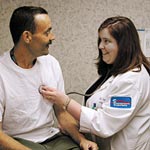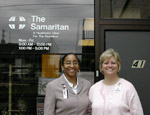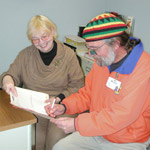Samaritans in Ohio: The Samaritan Homeless Clinic
Tucked into the cozy Midwest, famous for Buckeye football and the Rock and Roll Hall of Fame, Ohio seems like an unlikely place to confront homelessness. We are all familiar with the sight of people living on the streets of New York, but thoughts of Ohio conjure images of cornfields and college campuses. Yet, about 150,000 Ohioans were homeless as of last year, according to the Coalition on Homelessness and Housing in Ohio (COHHIO). Behind each name is a story of a struggle to survive.

Like homeless people everywhere, those in Ohio must deal with a variety of physical, psychological, and other needs. How does one find medicine, counseling, education, or any of the sundry services that provide a purchase with which to climb out of the pit of homelessness? Obtaining any single service is difficult; it can be nigh impossible to access the myriad necessary to get off the street permanently. That is where the Samaritan Homeless Clinic of Dayton, Ohio differentiates itself.
The Samaritan Homeless Clinic
The seeds of this clinic were planted in 1990 by anonymous donors who offered a three-year, $50,000 annual donation for the foundation of a homeless medical clinic. The following year, Good Samaritan Hospital agreed to begin and operate such a facility. What began as a one-room clinic with limited hours and offerings has expanded into the full-service operation of today.
The services provided by the clinic include medical, dental, vision, and psychiatric care, mental health and chemical dependency counseling, medical social work, health and life skills education, and respite care in supervised apartments. The vision of the Samaritan Homeless Clinic "is to be the national model for accessible quality, culturally competent, integrated, multidisciplinary primary and preventive services for homeless persons." This monumental work is supported by Good Samaritan Hospital, Standard Register (a document services company based in Dayton), federal grants, and private citizens.

The Samaritan Homeless Clinic's unique, holistic approach to homeless services, offering a complete array of care in one location, eliminates the need for patients to identify, locate, and access a number of different providers. By centralizing health care, the clinic staff hopes to facilitate access and to maximize benefit. This care includes such diverse offerings as breast exams and depression screening.
Moreover, the staff strives to empower patients through education to take control of their own lives. Educational topics are numerous and include exercise and fitness, reading skills, and employment skills, among others. Social workers provide case management and help patients navigate the path to a new life.
Judith K. Barr, Executive Director, points to centralized record keeping and organized communication among the staff members as ways to ensure consistency and continuity of care. Finally, patients are provided with access to additional service providers when needed, which, according to Ms. Barr, includes advocacy and transportation to specialists or emergency room visits.

While the clinic initially depended on volunteer labor, directors have switched to a permanent paid staff. This increases the clinic's financial need but, as Ms. Barr relates, provides consistency and helps to build patients' trust, which encourages the patients to return.
Today, care is provided by a staff that includes a family practice physician, a diagnostic technician, a dentist, a dental assistant, a dental hygienist, a mental health therapist, a chemical dependency counselor, a licensed independent social worker (LISW), a case manager, and several RNs and medical social workers. A podiatrist continues to provide monthly services on a volunteer basis, and other volunteers still provide valuable work in the form of office work, grant writing, landscaping, advising, and donation collection.
The Fruits of Their Labor

In 2005, the Samaritan Homeless Clinic provided services to 1964 patients. Almost 90% of those served had no insurance, which demonstrates the value the clinic adds to its community. Primary medical care, social work, dental services, and mental health counseling comprised the bulk of patient visits. Clients also took advantage of educational opportunities, primarily chemical dependency education. This confirms the clinic's premise that a wide range of health support is needed and appreciated by homeless persons.
The Samaritan Homeless Clinic has accomplished much. It is meeting the goal of providing integrated, multidisciplinary health care to a needy population. Yet, as long as the problem of homelessness remains, the work is unfinished. Donations to the clinic will support its care providers and enable them to continue to give comprehensive health care to the homeless of Dayton, Ohio.
About the Author
Marisa DeNoble Loeffler is a freelance science and medical writer and can be reached at 17bicentennial76@gmail.com.
About Angels in Medicine
Angels in Medicine is a volunteer site dedicated to the humanitarians, heroes, angels, and bodhisattvas of medicine. The site features physicians, nurses, physician assistants and other healthcare workers and volunteers who reach people without the resources or opportunities for quality care, such as teens, the poor, the incarcerated, the elderly, or those living in poor or war-torn regions. Read their stories at www.medangel.org.